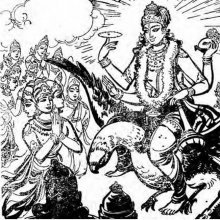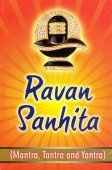Vishravas, Viśravas: 9 definitions
Introduction:
Vishravas means something in Hinduism, Sanskrit, Jainism, Prakrit. If you want to know the exact meaning, history, etymology or English translation of this term then check out the descriptions on this page. Add your comment or reference to a book if you want to contribute to this summary article.
The Sanskrit term Viśravas can be transliterated into English as Visravas or Vishravas, using the IAST transliteration scheme (?).
Images (photo gallery)
In Hinduism
Purana and Itihasa (epic history)
Source: archive.org: Puranic EncyclopediaViśravas (विश्रवस्).—Father of Rāvaṇa. General Information. Viśravas was the son born to Pulastya the son of Brahmā, by his wife Havirbhuk. The son Vaiśravaṇa was born to him by his wife Ilabilā (Iḍabiḍā) and Rāvaṇa and his brothers by his wife Kaikasī. In Mahābhārata, Vana Parva, Chapter 274, there is a story about the birth of Vaiśravaṇa (Kubera) as son to Viśravas.
The son Vaiśravaṇa was born to Pulastya. Vaiśravaṇa rejected his father Pulastya and served his grandfather Brahmā. Pulastya did not like this. He generated another son Viśravas from half of his body. Viśravas tried to wreak vengeance on Vaiśravaṇa, who took refuge near Brahmā, who was much pleased at Vaiśravaṇa and granted him immortality, the state of being the owner of wealth, the position of 'Lokapāla', connection with Śiva, a son named Nalakūbara, the city of Laṅkā, the Puṣpaka Vimāna, the lordship of the Yakṣas and the title Rājarāja (King of Kings). Family Life. Kubera engaged three beautiful Rākṣasa damsels, Puṣpotkaṭā, Rākā and Mālinī to attend on Viśravas. Puṣpotkaṭā had the name Kaikasī also. Kaikasī gave birth to Rāvaṇa and Kumbhakarṇa. Khara and Śūrpaṇakhā were born to Rākā and Mālinī gave birth to Vibhīṣaṇa. (Mahābhārata Vana Parva, Chapter 275, Verse 7). (See full article at Story of Viśravas from the Puranic encyclopaedia by Vettam Mani)
Source: archive.org: Shiva Purana - English TranslationViśravas (विश्रवस्) is the son of Pulastya in the Pādmakalpa, as mentioned in the Śivapurāṇa 2.1.19.—“[...] in the Kalpa called Pādma, I created my mental son Pulastya whose son Viśravas begot the son Vaiśravaṇa. He propitiated the three-eyed God Śiva, with a very severe penance and enjoyed the city of Alakā built by Viśvakṛt. When that Kalpa was over and the Meghavāhana Kalpa had started, the son of Yajñadatta, Śrīda, performed a severe penance”.
Source: Shodhganga: The saurapurana - a critical studyViśravas (विश्रवस्) is the son of Pulastya and Ilavilā: the daughter of Rājarṣi Tṛṇavindu, according to one account of Vaṃśa (‘genealogical description’) of the 10th century Saurapurāṇa: one of the various Upapurāṇas depicting Śaivism.—Accordingly, Rājarṣi Tṛṇavindu gave his daughter Ilavilā to Pulastya. Viśravas was born to her. Viśravas had four wives—Puṣpotkaṭā, Vākā, Kaikasī and Devavarṇinī. From Devavarṇinī was born Kubera, from Kaikasī were born Rāvaṇa, Kumbhakarṇa, Vibhīṣaṇa and Śūrpaṇakhā.

The Purana (पुराण, purāṇas) refers to Sanskrit literature preserving ancient India’s vast cultural history, including historical legends, religious ceremonies, various arts and sciences. The eighteen mahapuranas total over 400,000 shlokas (metrical couplets) and date to at least several centuries BCE.
In Jainism
General definition (in Jainism)
Source: archive.org: TrisastisalakapurusacaritraViśravas (विश्रवस्) is the name of a Vidyādhara, according to the Jain Ramayana and chapter 7.1 [origin of the rākṣasavaṃśa and vānaravaṃśa] of Hemacandra’s 11th century Triṣaṣṭiśalākāpuruṣacaritra: an ancient Sanskrit epic poem narrating the history and legends of sixty-three illustrious persons in Jainism.
Accordingly:—“[...] In the city Pātālalaṅkā sons were borne to Sukeśa by Indrāṇī—Mālin, Sumālin, and Mālyavat. Two long-armed sons, named Ādityarajas and Ṛkṣarajas, were borne to Kiṣkindhi by Śrīmālā. [...] Then Mālin became king in Laṅkā and Ādityarajas king in Kiṣkindhā at Kiṣkindhi’s command. [...] When Mālin was killed, the Rākṣasas and Vānaras were terrified and, commanded by Sumālin, went to the Laṅkā that is in Pātāla. Indra (son of Vidyādharī-queen Citrasundarī) at once granted Laṅkā to Vaiśramaṇa, the son of Viśravas, sprung from Kauśikā’s womb, and went to his own city. [...]”.

Jainism is an Indian religion of Dharma whose doctrine revolves around harmlessness (ahimsa) towards every living being. The two major branches (Digambara and Svetambara) of Jainism stimulate self-control (or, shramana, ‘self-reliance’) and spiritual development through a path of peace for the soul to progess to the ultimate goal.
Languages of India and abroad
Sanskrit dictionary
Source: DDSA: The practical Sanskrit-English dictionaryViśravas (विश्रवस्).—m. Name of a son of Pulastya, and father of Rāvaṇa, Kumbhakarṇa, Bibhīṣaṇa and Śūrpaṇakhā by his wife Kaikasī and of Kubera by his wife Iḍāviḍā.
Source: Cologne Digital Sanskrit Dictionaries: Benfey Sanskrit-English DictionaryViśravas (विश्रवस्).—[vi-śravas], m. A proper name, [Rāmāyaṇa] 3, 53, 30.
Source: Cologne Digital Sanskrit Dictionaries: Cappeller Sanskrit-English DictionaryViśravas (विश्रवस्).—1. [neuter] great renown, glory.
--- OR ---
Viśravas (विश्रवस्).—2. [adjective] famous, glorious, [Name] of a Ṛṣi.
Source: Cologne Digital Sanskrit Dictionaries: Monier-Williams Sanskrit-English Dictionary1) Viśravas (विश्रवस्):—[=vi-śravas] [from vi] n. great fame, [Śatapatha-brāhmaṇa; Kātyāyana-śrauta-sūtra; Vaitāna-sūtra]
2) [v.s. ...] mfn. famous, [Brāhmaṇa; Kātyāyana-śrauta-sūtra]
3) [v.s. ...] m. Name of a Ṛṣi (son of Pulastya and father of Kubera, Rāvaṇa, Kumbha-karṇa and Vibhīṣaṇa), [Mahābhārata; Harivaṃśa; Rāmāyaṇa; Bhāgavata-purāṇa] =
[Sanskrit to German]
Sanskrit, also spelled संस्कृतम् (saṃskṛtam), is an ancient language of India commonly seen as the grandmother of the Indo-European language family (even English!). Closely allied with Prakrit and Pali, Sanskrit is more exhaustive in both grammar and terms and has the most extensive collection of literature in the world, greatly surpassing its sister-languages Greek and Latin.
See also (Relevant definitions)
Starts with: Vishravasa, Vishravashrama.
Ends with: Havishravas, Tuvishravas.
Full-text (+43): Kubera, Ilavila, Vaishravana, Kaikasi, Kumbhakarna, Vaka, Ravana, Shurpanakha, Pushpotkata, Devavarnini, Prahasta, Vibhishana, Dushana, Mahodara, Pulastya, Trishira, Vidyujjihva, Visravana, Ilibila, Khara.
Relevant text
Search found 21 books and stories containing Vishravas, Vi-shravas, Vi-śravas, Vi-sravas, Viśravas, Visravas; (plurals include: Vishravases, shravases, śravases, sravases, Viśravases, Visravases). You can also click to the full overview containing English textual excerpts. Below are direct links for the most relevant articles:
Puranic encyclopaedia (by Vettam Mani)
Ramayana of Valmiki (by Hari Prasad Shastri)
Chapter 2 - The Birth of Vishravas < [Book 7 - Uttara-kanda]
Chapter 3 - Vishravas becomes the Protector of Wealth < [Book 7 - Uttara-kanda]
Chapter 9 - The Birth of Dashagriva and his Brothers < [Book 7 - Uttara-kanda]
The Skanda Purana (by G. V. Tagare)
Chapter 47 - Rāma’s Sin of Brahma-hatyā < [Section 1 - Setu-māhātmya]
Chapter 168 - The Greatness of Āṅkūreśvara (āṅkūra-īśvara-tīrtha) < [Section 3 - Revā-khaṇḍa]
Chapter 41 - The Greatness of Kuṇḍaleśvara (kuṇḍala-īśvara-tīrtha) < [Section 3 - Revā-khaṇḍa]
The Agni Purana (by N. Gangadharan)
Chapter 11 - Manifestation of Viṣṇu as Rāma (part 7)
The Gautami Mahatmya (by G. P. Bhatt)
Mahabharata (English) (by Kisari Mohan Ganguli)
Section LXXXIX < [Tirtha-yatra Parva]
Section CCLXXIX < [Draupadi-harana Parva]
Section CLXV < [Anusasanika Parva]
Related products

